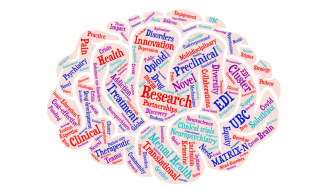Effective, innovative solutions to clinical mental health challenges require new strategies (bench to beside to community) for developing new therapeutic options, including rapid-acting antidepressants and non-opioid alternatives to treat pain and key aspects of substance use disorders.
It is estimated that one in five Canadians experiences a mental illness in any given year. Recently, this has been exacerbated by the opioid overdose crisis, particularly in British Columbia where nearly 1500 lives were lost to illicit drugs in the first eight months of 2022 alone, as well as the COVID-19 pandemic with its far-reaching negative effects on mental health and access to care. These growing health and socioeconomic issues highlight the urgent unmet clinical need for innovative solutions and new, more effective treatments to improve patient outcomes.
In addition to the traditional bench-to-bedside approach in research, two promising neuroscience research strategies to address this gap are the integration of foundational and clinical research, and the concept of ‘reverse translation’, which prioritizes insights from clinicians and front-line healthcare workers in inspiring translational research with potential for immediate and significant clinical impact.
MATRIX-N is a network of emerging and internationally recognized leaders and trainees in translational neuropsychiatry research and medicine, bringing diverse perspectives and long-standing expertise. The Cluster seeks to bridge gaps between research, clinical practice and patient needs to facilitate innovative solutions to local and global mental health challenges.
The cluster aims to create new multidisciplinary collaborations between foundational and clinical researchers at UBC and beyond. We aim to increase the translational power of neuropsychiatry research into novel pharmacotherapies and ensure more cost-effective and clinically-relevant drug development processes.

